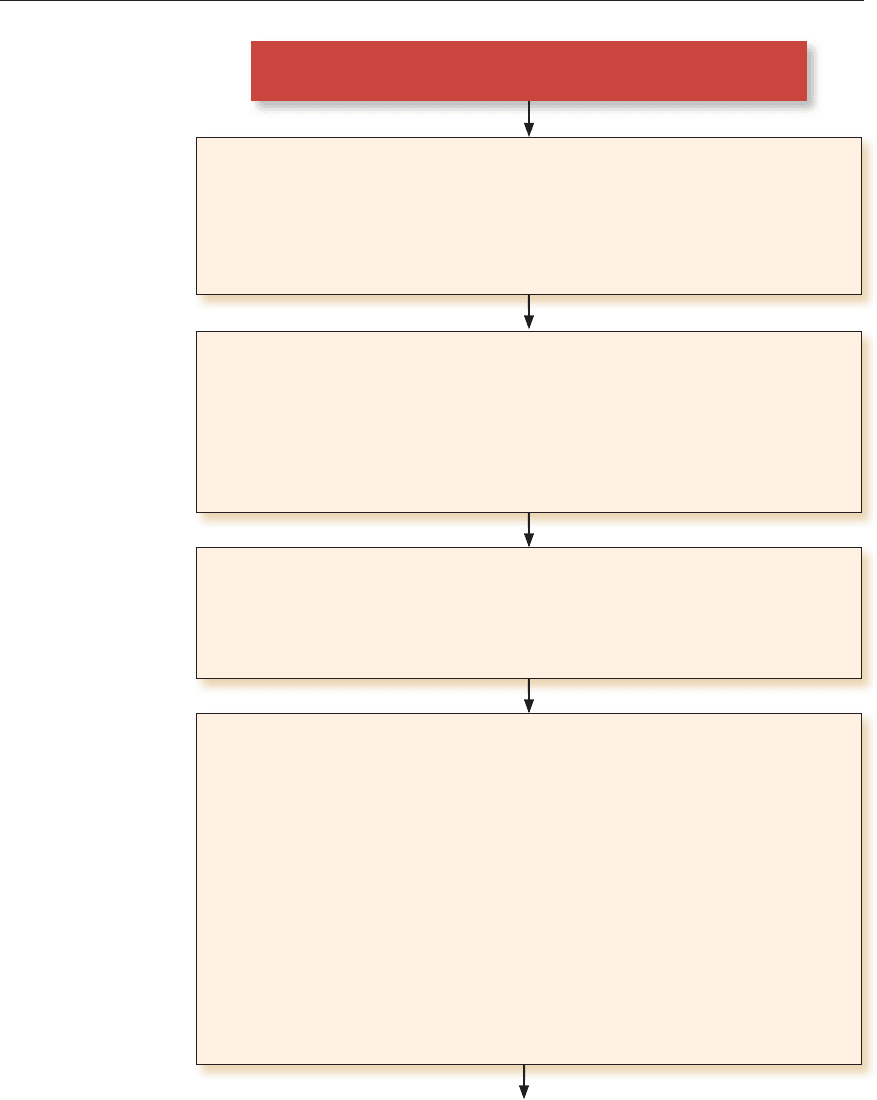Anker Susan. Real Essays with Readings with 2009 MLA Update
Подождите немного. Документ загружается.


867
Appendix
Problem Solving in Writing
Some writing assignments, both in English and in other subjects, will re-
quire you to use problem-solving skills. Such assignments will ask you to
read and analyze a problem in order to develop possible solutions, often
by synthesizing information from various sources.
Problem-solving skills are necessary not only in college but also — and
even more so — in the work world. Often, managers assign a team to work
on and pose possible solutions to a problem that the organization faces.
Also, problem-solving skills will help you in your everyday life when you
run into a situation that you want to change.
Each of the chapters in Part Two includes problem-based writing as-
signments (“Writing to Solve a Problem”). These assignments offer you the
opportunity to solve real-world problems by working alone or as part of a
team. Use the following section to complete those assignments or to address
any problem you may face in college, at work, or in your everyday life.
Problem Solving
Problem solving is the process of identifying a problem and fi guring out a
reasonable solution.
Problems range from minor inconveniences like fi nding a rip in the
last clean shirt you have when you’re running late to more serious prob-
lems such as being laid off from your job. While such problems disrupt
our lives, they also give us opportunities to tackle diffi cult situations with
confi dence.
Too often, people are paralyzed by problems because they don’t have
strategies for attacking them. However, backing away from a problem
rarely helps solve it. When you know how to approach a challenging situ-
ation, you are better able to take charge of your life.
Problem solving consists of fi ve basic steps, which can be used effec-
tively by both individuals and groups of people.
ANK_47574_53_App_pp867-870 r2 sv.indd 867ANK_47574_53_App_pp867-870 r2 sv.indd 867 10/29/08 10:31:27 AM10/29/08 10:31:27 AM

APPENDIX
868 Problem Solving in Writing
THE PROBLEM-SOLVING PROCESS
Understand the problem.
You should be able to say or write it in a brief statement or question.
EXAMPLE:
Your ten-year-old car needs a new transmission, which will cost at least $750.
Do you keep the car or buy a new one?
Identify people or information that can
help you solve the problem (resources).
EXAMPLES:
• Your mechanic
• Friends who have had similar car problems
• Car advice from print or Web sources
List the possible solutions.
EXAMPLES:
• Pay for the transmission repair.
• Buy a new car.
Evaluate the possible solutions.
1. Identify the steps each solution would require.
2. List possible obstacles for each solution (like money or time constraints).
3. List the advantages and disadvantages of the solutions.
EXAMPLES (considering only advantages and disadvantages):
• Pay for the transmission repair.
Advantage: This would be cheaper than buying a new car.
Disadvantage: The car may not last much longer, even with the new trans-
mission.
• Buy a new car.
Advantage: You’ll have a reliable car.
Disadvantage: This option is much more expensive.
ANK_47574_53_App_pp867-870 r2 sv.indd 868ANK_47574_53_App_pp867-870 r2 sv.indd 868 10/29/08 10:31:27 AM10/29/08 10:31:27 AM

APPENDIX
Problem Solving in Writing 869
Choose the most reasonable solution, one that is realistic — the
simpler the better. Be able to give reasons for your choice.
Solution: Pay for the transmission repair.
Reasons: You do not have money for a new car, and you don’t want to assume
more debt. Opinions from two mechanics indicate that your car should run for
three to fi ve more years with the new transmission. At that point, you’ll be in a
better position to buy a new car.
ANK_47574_53_App_pp867-870 r2 sv.indd 869ANK_47574_53_App_pp867-870 r2 sv.indd 869 10/29/08 10:31:28 AM10/29/08 10:31:28 AM
ANK_47574_00_FM_ppi-xxxiv r2 ko.indd iiANK_47574_00_FM_ppi-xxxiv r2 ko.indd ii 10/29/08 9:58:44 AM10/29/08 9:58:44 AM
This page intentionally left blank

CHAPTER 22: THE BASIC SENTENCE
Practice 22-1, page 387
Possible answers:
1. student; at; wanted; and 3. cars; continually; made;
angry 5. decisively; he; refused; of
Practice 22-2, page 390
Answers:
1. Subject: people; prepositional phrase: around the country
3. Subject: Ronald; prepositional phrase: in a program called
Puppies Behind Bars 5. Subject: Cooper; prepositional phrases:
in the cell; with him 7. Subject: Ronald; prepositional
phrases: before the start; of Cooper’s formal guide dog
training 9. Subject: Cooper; prepositional phrase: with a
blind person
Practice 22-3, page 394
Answers:
1. Subject: family; action verb: moved 3. Subject: Miguel;
helping verb + main verb: was learning 5. Subject: he;
linking verb: was 7. Subject: plan; helping verb + main
verb: had been 9. Subject: family; linking verb: is
Practice 22-4, page 395
Answers and possible edits:
1. I (incomplete thought); Most young people like the
very latest styles in music, although some prefer classic
rock. 3. C (complete thought) 5. C (complete thought)
7. I (incomplete thought); Playing loud music at a bus stop
ought to be illegal. 9. I (incomplete thought); Even with
too many people signed up for the softball team, the coach
gave everyone a chance to play.
Practice 22-5, page 397
Answers:
1. S-V 3. S-LV-ADJ 5. S-LV-ADV 7. S-V-IO-(ADJ)-
DO 9. S-V-ADV
Editing Reviews, pages 398, 399
Possible edits:
1. (1) It can be easier to help others than many people
think. (2) For example, a person can donate his or her hair.
(3) Some people need donated hair in the form of wigs.
(4) Who uses these wigs? (5) Mostly, children with cancer
or other diseases that cause hair loss need wigs. (6) Donating
is popular, especially with young girls. (7) More and more
frequently, though, men and boys are contributing hair.
(8/9) For example, one nonprofi t organization receives
up to 2,000 locks of hair every week. (10) Unfortunately,
most of the donated hair is unusable for this charity’s wigs.
(11) The charity’s guidelines are quite strict. (12) The orga-
nization must reject hair that is gray, wet, moldy, too short,
or too processed. (13) It is able to sell some rejected hair to
help meet the group’s costs. (14) But the organization con-
tinues to encourage donations. (15) Obviously, contributors
feel they are getting more than they are giving.
3. (1) Taking a peek at a fellow passenger’s computer
screen is OK to do, right? (2) This is a serious question at
a time when airplane fl ights are tightly packed and laptop
use is common. (3) What if the person in the next seat is
watching an offensive movie without headphones? (4) A
recent survey showed that 45 percent of business travelers
admit to peeking at someone else’s laptop in a public place.
(5) In many cases, it is nearly impossible to avoid getting
a glimpse of a nearby screen. (6) So, what is the proper
etiquette for in-fl ight laptop use? (7) If you are using your
laptop, bring headphones. (8) Do not watch movies that are
in poor taste. (9) If a neighbor seems interested, invite him
or her to watch. (10) If you are sitting next to a laptop user,
don’t peek. (11) However, if the movie he or she is watching
looks interesting, it is OK to ask politely to watch. (12) If
the sound is too high or the content offensive, tell the laptop
user. (13) If that does not work, ask a fl ight attendant for
assistance.
CHAPTER 23: FRAGMENTS
Practice 23-2, page 405
Answers:
1. Dependent words: Even after. Even after having a walk,
these dogs become nervous and overly excited. 3.
Preposi-
tion: To. To address this growing need, a new type of service
is springing up, especially in the larger cities of the country.
5. Preposition: at. A runner will come to the owner’s home
and take the dog out for some vigorous exercise, at a price
of around thirty to forty dollars. 7. Dependent word: while.
The runners have the chance to earn some much-needed
cash, while they get some great exercise for both the dogs
and themselves. 9. Dependent word: if. But the larger dogs,
especially young retrievers, Dalmatians, and Weimaraners,
are perfect for this, if they’re strong and healthy.
Answers to Odd-Numbered
Editing Exercises
A-1
ANK_47574_54_Ans_ppA1-A19 r3 jk.indd A-1ANK_47574_54_Ans_ppA1-A19 r3 jk.indd A-1 10/29/08 10:32:00 AM10/29/08 10:32:00 AM

Practice 23-3, page 406
Possible edits:
For decades, scholars have argued about when and
how chickens reached the Americas. One theory is that
Portuguese and Spanish settlers brought them when they
arrived after 1500. Another suggests that the chickens
were brought over by Polynesian visitors before Colum-
bus’s voyages. Most scholars once believed that the Portu-
guese and Spanish brought chickens to the Americas, along
with seeds, medicinal plants, and other necessities. Now, re-
searchers think they fi nally know what happened, thanks to
some revealing evidence found on the coast of Chile, where
chicken bones were discovered, along with some pottery that
was defi nitely dated between 1304 and 1424, or even earlier.
Anthropologists performed a DNA analysis on the bones,
which revealed that the chickens from Chile had a close ge-
netic relationship to chickens from several Polynesian sites
on the islands of Tonga and American Samoa. When these
fi ndings were published, some anthropologists said the dis-
covery supports the idea that Polynesians had by that time
populated the Pacifi c and had even reached the Americas.
Though the chicken bones matched Polynesian chickens, the
pottery found with the bones was of the local Chilean style.
However, it is still unclear whether it was the local Chileans
or the visiting Polynesians who ate the chickens back then.
Practice 23-4, page 408
Answers and possible edits:
1. -ing verb: living. My grandmother spent her entire life
living on a farm in eastern Wyoming. 3. -ing verb: creat-
ing. She was a natural seamstress. My grandmother created
shirts and dresses more beautiful than anything available in
a store. 5. -ing verb: using. The quilting circle made quilts
for special occasions using scraps of cloth left over from
other sewing projects. 7. -ing verb: Celebrating. Celebrat-
ing the birth of her fi rst child, my father, the quilting circle
gave my grandmother a baby quilt that is now a treasured
heirloom. 9. -ing verb: Looking. Looking at each bit of
cloth in that quilt, my grandmother could still describe,
years later, the garment she had made from it.
Practice 23-5, page 410
Answers and possible edits:
1. To + verb: To lift weights. To lift weights, bodybuild-
ers then met at the Muscle Beach of Santa Monica in Los
Angeles. 3. To + verb: to lift. Muscle Beach had become
known as Venice by then, but bodybuilders still went there
to lift railroad ties and buckets fi lled with concrete. 5. To
+ verb: To get. To get the best possible workout, Arnold
Schwarzenegger regularly went to Gold’s Gym in Venice.
7. To + verb: To have. To have a realistic setting for the
1977 movie Pumping Iron, the fi lmmaker selected Gold’s
Gym. 9. To + verb: to sell. In the early 1970s, however,
Joe Gold made a decision to sell his original business along
with the name Gold’s Gym to another company.
Practice 23-6, page 413
Possible edits:
1. Many parents believe that they would know if their
daughters were being abused, either physically or emotion-
ally. 3. A young man can be abusive without laying a fi n-
ger on his girlfriend. He might monitor her actions and keep
her from spending time with other friends. 5. Around her
parents, a teenager’s boyfriend may act like a perfect gentle-
man. He may be polite, attentive, and kind to the young
woman. 7. A young woman with an abusive boyfriend
may develop psychological problems that will be diffi cult to
treat, such as low self-esteem. 9. Friends who think that a
young woman is involved in an abusive relationship should
try to be supportive of her, not turn away even if she refuses
to leave her boyfriend.
Editing Reviews, pages 415, 416
Possible edits:
1. (1/2) Genetically modifi ed foods are being marketed
as the foods of the future. (3) Correct (4) Correct (5/6) A
gene from a fi sh may be found to make tomatoes more
resistant to disease. (7/8/9) Of course, genetic modifi cation
may have unintended effects, as in the case of genetically
modifi ed corn, which may harm monarch butterfl y caterpil-
lars. (10/11) Arguing that the long-term effects of genetic
modifi cation may not be known for years to come, some
scientists urge caution before marketing genetically modi-
fi ed foods.
3. (1/2) For several years, the U.S. Department of Ag-
riculture has permitted the irradiation of certain foods sold
in American supermarkets. (3/4) Irradiating produce kills
bacteria on the food, increasing its shelf life. (5) Correct
(6/7) An irradiated strawberry, in contrast, can last a week
or more, because the bacteria that would cause it to spoil
are killed by radiation. (8/9) While some consumers worry
about buying irradiated food, others dismiss these concerns
as the effect of too many science-fi ction movies. (10/11) In
stores where irradiated fruits and vegetables are sold under
banners announcing the radiation treatment, the owners
report a booming market.
CHAPTER 24: RUN-ONS
Practice 24-2, page 422
Answers and possible edits:
1. CS (comma splice). The invention of cell phones made
telephoning from a car possible. People could telephone
for help if they were stranded on the highway. 3.
CS
(comma splice). Some communities in the United States
have banned drivers from talking on handheld cell phones; a
A-2 Answers to Odd-Numbered Editing Exercises
ANK_47574_54_Ans_ppA1-A19 r3 jk.indd A-2ANK_47574_54_Ans_ppA1-A19 r3 jk.indd A-2 10/29/08 10:32:00 AM10/29/08 10:32:00 AM

driver must stop the car to place a call legally in those areas.
5. FS (fused sentence). No one debates that drivers can be
distracted by cell phones. Some people wonder, however,
whether the problem is really the fact that a driver is hold-
ing the phone. 7. FS (fused sentence). Some people worry
that drivers are distracted not by holding the telephone, but
by having a conversation. A tense discussion with the boss
or good news from a relative can take the driver’s attention
from traffi c. 9. CS (comma splice). There are differences,
however, between talking on a cell phone and listening to
music in the car. The telephone requires interaction from
the driver, but the radio calls for passive listening.
Practice 24-3, page 424
Answers and possible edits:
1. Subjects: penguins; birds. Verbs: live; have been. Fairy
penguins, a small breed of penguin, live in Tasmania,
and these birds have often been the victims of oil spills.
3. Subjects: attempts; oil. Verbs: can be; is. Unfortunately,
the penguins’ attempts to clean off their feathers can be fatal,
for crude oil is poisonous to penguins. 5. Subjects: One;
volunteers. Verbs: created; knitted. One of the conservation-
ists created a pattern for a sweater for the penguins, and
volunteers from around the world knitted these unusual
sweaters. 7. Subjects: Most; some. Verbs: were made; were
sent. Most of the sweaters were made by elderly nursing-
home residents in Tasmania, but some were sent from as
far away as Japan. 9. Subjects: knitters; few. Verbs: made;
have. Some creative knitters made tuxedo-patterned sweat-
ers, and a few of these penguin suits even have bow ties.
Practice 24-4, page 427
Answers and possible edits:
1. Subjects: phenomenon; it. Verbs: is; may be chang-
ing. Although this phenomenon is something we take for
granted, it may be changing. 3. Subjects: change; mate-
rials. Verbs: happened; pointed. Such a change happened
before in the earth’s history, when magnetic materials
pointed south instead of north for long periods. 5. Sub-
jects: change; satellites. Verbs: has affected; have been. The
change in magnetism has affected some satellites, which
have been damaged. 7. Subjects: bees, pigeons, salmon,
turtles, whales, newts, bacteria; they. Verbs: need; will ad-
just. Because bees, pigeons, salmon, turtles, whales, newts,
and even bacteria need the magnetic fi eld to navigate, they
will adjust to the magnetic change. 9. Subjects: processes;
change. Verbs: may unfold; may occur. The processes
affecting magnetism may unfold much more slowly, so that
the magnetic change may not occur for millions of years.
Editing Reviews, pages 429, 430
1. (1) Correct (2) It’s often easy to forget things when
you want desperately to remember them. (3) You have
probably had the experience of forgetting an acquaintance’s
name, which comes to your mind only when it’s too late.
(4) You have also probably been unable to fi nd your keys
once in a while because you put them down somewhere
without thinking. (5) At other times, however, you may
fi nd it diffi cult to forget some things even though you wish
you could never think of them again. (6) Correct (7) Some-
times, you may fi nd yourself forced to relive your most em-
barrassing moment over and over again in your mind; your
memory won’t let you leave that part of your past behind.
(8) Some scholars believe that these annoying habits of
memory evolved for a reason. It’s hard to imagine, though,
any good reason for developing the ability to forget where
you left your keys.
3. (1) The number of bike riders is growing, especially
in American cities because increasing numbers of people
are riding bikes to work and for exercise. (2) This makes it
all the more important for drivers and bike riders to learn
to share the road. Every year, approximately 46,000 bike
riders are injured in crashes with motor vehicles. (3) The
good news is that most of these accidents are prevent-
able, but it takes special care on the part of both drivers
and riders. (4) Car drivers need to recognize that bicycles
have a legal right to use most roads, although bikes must
ride on the shoulder when the speed limit is over fi fty miles
per hour. (5) When coming up on a cyclist, slow down;
when passing, give the bike at least three feet of clearance.
(6) Be especially careful with young cyclists, even those on
the sidewalks, because they can suddenly dart out in traffi c
without looking. (7) When making a right turn, make sure
there is no bicycle on the right; when waiting to turn left or
at a stop sign, yield to a bicycle that has the right of way.
(8) Check carefully for bicycles before opening a car door.
Cyclists have been killed by headlong crashes into suddenly
opened car doors. (9) Bike riders need to follow the same
traffi c rules that apply to drivers. Wait for a green light
before crossing intersections and signal before all turns and
stops. (10) Try to ride at least three feet from parked cars;
do not weave in and out between parked cars. (11) Don’t
ride wearing headphones or while talking on a cell phone,
and always wear a properly fi tted bike helmet. (12) Increas-
ing bike riding is a good sign for the environment and for
Americans’ expanding waistlines, but for everyone’s safety,
both drivers and riders must vigilantly follow the rules of
road-sharing.
CHAPTER 25: PROBLEMS WITH SUBJECT-VERB
AGREEMENT
Practice 25-2, page 438
Answers:
1. Subject: people; verb: have 3. Subject: ovens; verb: do
5. Subject: amount; verb: is 7. Subject: ovens; verb: have
9. Subject: level; verb: does
Answers to Odd-Numbered Editing Exercises A-3
ANK_47574_54_Ans_ppA1-A19 r3 jk.indd A-3ANK_47574_54_Ans_ppA1-A19 r3 jk.indd A-3 10/29/08 10:32:01 AM10/29/08 10:32:01 AM

Practice 25-3, page 439
Answers:
1. Subject: students; verb: are 3. Subject: computer; verb:
does 5. Subject: program; verb: has 7. Subject: teachers;
verb: are 9. Subject: computer; verb: does
Practice 25-4, page 440
Answers:
1. Prepositional phrase: with hearing loss; verb: have 3. Prep-
ositional phrase: with words; verb: comes 5. Prepositional
phrase: in this country; verb: feel 7. Prepositional phrase: in
a deaf household; verb: resembles 9. Prepositional phrase: to
the hearing world and the deaf world; verb: pull
Practice 25-5, page 442
Answers:
1. Dependent clause: which is a job applicant’s fi rst contact
with many prospective employers; verb: contains 3. De-
pendent clause: who held a previous job for two months;
verb: claims 5. Dependent clause: who never received a
college degree; verb is OK 7. Dependent clause: who like a
résumé; verb: check 9. Dependent clause: who invent ma-
terial on a résumé; verb: forget
Practice 25-6, page 443
Answers:
1. Subject joined by: and; verb: do 3. Subject joined by: or;
verb: is 5. Subject joined by: and; verb: contain 7. Subject
joined by: and; verb: contribute 9. Subject joined by: nor;
verb: are
Practice 25-7, page 445
Answers:
1. Many are middle-aged or older. 3. But everybody needs
exercise that is safe, practical, and enjoyable. 5. Nobody
pursues activities that might risk bodily damage. 7. Some
do it to lose weight. 9. Others enjoy looking at people,
stores, and the outdoors as they exercise and observing the
new and unusual around them.
Practice 25-8, page 447
Answers:
1. Where are the corporation’s main offi ces located?
3. How well does the average employee abroad speak
English? 5. How many languages is the manual written
in? 7. There are some machines that can do translation.
9. OK
Editing Reviews, pages 448, 449
Answers:
1. (1) School systems around the country are em-
bracing educational standards. (2) The idea of standards
sounds reasonable. (3) Correct (4) A national standard for
all American students has many supporters, too. (5) If the
requirements for graduation in Oregon and Tennessee are
the same, everyone with a high school diploma gets a simi-
lar education. (6) Correct (7) Correct (8) Mathematics and
writing are important, but so are music and physical educa-
tion. (9) How are parents, teachers, and administrators ever
going to fi nd standards that everyone accepts?
3. (1) Correct (2) Most school districts that have a
testing program use tests that can be scored by a computer.
(3) Computers cannot read, so the tests that they grade usu-
ally offer multiple-choice questions. (4) A multiple-choice
test in science or mathematics does not allow students to
demonstrate critical thinking. (5) How do students show
their writing ability on such a test? (6) There are tricks to
answering multiple-choice questions that many students
learn. (7) Correct (8) Nevertheless, the quick results and
low cost of a computer-graded multiple-choice test mean
that this imperfect testing system is used in many school
systems.
CHAPTER 26: VERB PROBLEMS
Practice 26-2, page 454
Answers:
1. Subject: doors; verb: open 3. Subject: system; verb: works
5. Subject: display; verb: indicates 7. Subject: managers;
verb: claim 9. Subject: They; verb: wait
Practice 26-3, page 456
Answers:
1. Helping verb: is; main verb: starting 3. Helping verb: is;
main verb: gathering 5. Helping verb: are; main verb: help-
ing 7. Helping verb: is; main verb: pitching 9. Helping
verb: is; main verb: sharing
Practice 26-4, page 458
Answers:
1. Helping verb: has; past participle: forced 3. Helping
verb: have; past participle: attended 5. Helping verb: have;
past participle: objected 7. Helping verb: have; past parti-
ciple: traveled 9. Helping verb: has; past participle: liked
Practice 26-5, page 459
Answers:
1. decided 3. cared 5. engaged 7. participated; stopped
9. charged 11. died
Practice 26-6, page 460
Answers:
1. have increased 3. have attempted 5. raised 7. vio-
lated 9. have started
A-4 Answers to Odd-Numbered Editing Exercises
ANK_47574_54_Ans_ppA1-A19 r3 jk.indd A-4ANK_47574_54_Ans_ppA1-A19 r3 jk.indd A-4 10/29/08 10:32:01 AM10/29/08 10:32:01 AM

Practice 26-7, page 461
Answers:
1. Helping verb: were; main verb: climbing 3. Helping
verb: were; main verb: focusing 5. Helping verb: was;
main verb: having 7. Helping verb: was; main verb: stop-
ping 9. Helping verb: were; main verb: watching
Practice 26-8, page 463
Answers:
1. got 3. had heard 5. had just learned 7. raised
9. had warned
Practice 26-9, page 466
Answers:
1. will be using 3. will be planning 5. will have checked
7. will wait 9. will have rescued
Practice 26-10, page 467
Answers:
1. am 3. has 5. are 7. has 9. are
Practice 26-11, page 469
Answers:
1. was 3. was 5. were 7. was 9. was; were
Practice 26-12, page 472
Answers:
1. built 3. wrote 5. struck 7. began 9. left; stood
Practice 26-13, page 473
Answers:
1. Two years ago, my high school set up a student court to
give students a voice in disciplining rule breakers. 3. Some
of us served as members of juries, and others became advo-
cates or even judges. 5. Then, last spring, my friend De-
wayne appeared before the student court after he lost his
temper and struck a fellow student. 7. I told the jury that
he knew his violent reaction was a mistake. 9. After hear-
ing the verdict, Dewayne shook hands with all the jurors
and thanked them for their fairness.
Practice 26-14, page 474
Answers:
1. Helping verb: had; past participle: taken 3. Helping
verb: had; past participle: begun 5. Helping verb: had; past
participle: been 7. Helping verb: had; past participle: bought
9. Helping verb: had; past participle: sold
Practice 26-15, page 476
Possible edits:
1. The Queen Mary 2 has a grand lobby and an old-style
three-story restaurant. 3. The ship’s computer systems
can automatically correct the effects of the wind, waves,
and ocean currents. 5. He said he would probably use the
joystick more in the future.
Practice 26-16, page 477
Answers:
1. Verbs: want, needed; corrected verb: need 3. Verbs:
makes, caused; corrected verb: causes 5. Verbs: wore,
snap; corrected verb: wear 7. Verbs: chose, knows; corrected
verb: chooses 9. Verbs: kept, eases; corrected verb: keeps
Editing Reviews, pages 489, 491
Answers:
1. (1) Since 1835, trapeze artists have considered the
triple somersault the most dangerous maneuver. (2) That
year, a performer tried to do a triple somersault on a trapeze
for the fi rst time and died in the attempt. (3) Only one per-
son managed to do the trick successfully in the next sixty-
three years. (4) That man, a trapeze artist named Armor,
did a triple somersault in 1860 and was afraid to try it again.
(5) According to circus legend, the second person to survive
the triple, Ernie Clarke, once did a quadruple somersault in
private. (6) Correct (7) Circus historians now believe that
Alfredo Codona, a performer in the 1920s and 1930s, was
the greatest master of the triple somersault. (8) He has gone
down in history as the King of Trapeze.
3. (1) The Olympic Games fi rst let women compete in
swimming events in 1912, and with that, the swimsuit revo-
lution began. (2) Correct (3) Before that year, women had
only been able to wade at the beach in bathing costumes
with long, baggy legs. (4) The 1913 suits, designed by Carl
Jantzen, were ribbed one-piece outfi ts that allowed actual
swimming. (5) An engineer, Louis Réard, came up with the
next major development in swimwear in 1946 while working
in the lingerie business. (6) He called it the “bikini,” after a
Pacifi c island used for testing the atomic bomb. (7) In the
1950s, few Americans dared to wear bikinis, which were
considered scandalous. (8) Two-piece swimsuits caught on
in the 1960s and 1970s. (9) The bikini lost some popularity
in the last decades of the twentieth century, but it has made
a triumphant return in the new millennium.
CHAPTER 27: PRONOUNS
Practice 27-1, page 496
Answers:
1. Pronoun: they; noun: people 3. Pronoun: it; noun: micro-
lending 5. Pronoun: them; noun: owners 7. Pronoun: her;
noun: woman 9. Pronoun: his or her; noun: entrepreneur
Practice 27-2, page 499
Answers:
1. his or her 3. their 5. himself or herself 7. they need
9. their
Answers to Odd-Numbered Editing Exercises A-5
ANK_47574_54_Ans_ppA1-A19 r3 jk.indd A-5ANK_47574_54_Ans_ppA1-A19 r3 jk.indd A-5 10/29/08 10:32:01 AM10/29/08 10:32:01 AM

A-6 Answers to Odd-Numbered Editing Exercises
Practice 27-3, page 501
Answers:
1. its 3. their 5. its 7. its 9. its
Practice 27-4, page 502
Possible edits:
1. In a psychology study, volunteers who watched a video
of two basketball teams had to count the number of passes.
3. Later, when meeting with the researchers, many of the
volunteers asked, “What gorilla?” 5. The way the human
brain processes visual information may keep people from
using that information wisely. 7. A stop sign appearing at
an intersection cannot prevent an accident if drivers do not
see the sign. 9. However, the study indicates that drivers
make mistakes because they may not see problems ahead.
Practice 27-5, page 504
Answers:
1. Robots have been part of many science-fi ction classics,
from The Jetsons to Star Wars. 3. In some industries, robots
are already part of the workforce. 5. Additionally, a fac-
tory might use robots to handle substances that are danger-
ous for humans to touch. 7. Some children who wanted a
robot friend have already gotten their wish. 9. The robot
dog was fi rst on many holiday and birthday gift lists for
children in the past few years.
Practice 27-6, page 507
Answers:
1. However, a TV program on dental health started making
her and me rethink our soda-drinking habit. 3. Dr. Sum-
mers asked Ian to place a tooth in a bottle of soda, and she
and he observed what happened to the tooth. 5. The re-
sult of the experiment surprised her and me. 7. They and
we said “Wow” at the same time. 9. Megan and I learned
that each can of soda we drink contains about ten teaspoons
of sugar, which creates even more tooth-dissolving acid and
contributes to weight gain.
Practice 27-7, page 508
Answers:
1. We saw how some other roommates had confl icts right
away, and we were happy that we got along better than
they. 3. She became romantically involved with Brad, and
she eventually began to care more for him than me. 5. I
couldn’t understand why she wanted to spend more time
with him than with me. 7. Another friend of mine, Haley,
solved the problem, and no one could have been as gentle
with my feelings as she. 9. She pointed out that a similar
confl ict had developed between her and a lifelong friend,
but understanding and open communication had saved
their friendship.
Practice 27-8, page 510
Answers:
1. who 3. whom 5. who
Practice 27-9, page 511
Possible edits:
1. Experts agree that the percentage of people with allergies
to foods is rising, but they don’t know why. 3. If a person
has a severe allergy to a food and unknowingly eats even a
small amount of that food, he or she could die. 5. When
children have severe allergies, their parents can be extremely
cautious. 7. He carries an adrenaline pen that can save his
life if he goes into shock from a food allergy. 9. My mother
will not take my brother to any public place where she can
even smell peanuts.
Editing Reviews, pages 512, 514
Possible edits:
1. (1) When a store makes a mistake with an order,
the customer should complain to it. (2) But some people
are more effective than others at complaining. (3) A good
example of this was when Gary, who is in charge of facilities
for his social club, ordered a barbecue grill. (4) When Gary
called to place his order, he was pleased because he was
connected to a sales person right away. (5) The ordering
process between him and the sales person went smoothly,
including the store’s offer of free assembly of the barbecue,
but things went downhill after that. (6) When Gary went to
the store on the agreed-upon day to pick up the assembled
barbecue, the store’s manager told him it was not assem-
bled. (7) Gary lost his temper and screamed at the store
manager, causing several nearby customers to abandon the
products they were going to buy. (8) Gary kept yelling and
the store manager kept calmly responding, but Gary soon
angrily stormed out to the parking lot and drove away. (9)
Therefore, the social club did not get its barbecue grill that
day. (10) After Gary explained this to Natalie, the club’s
president, she said she didn’t know whom to blame more,
Gary or the store manager. (11) She was better at diplo-
macy than he, so he and she agreed that Natalie would com-
municate with the store from then on. (12) When calling
the store, Natalie was polite, patient, and fi rm in discussing
with the manager how to correct the situation. (13) The
result was that the store delivered the barbecue grill that
same day, and the store manager gave the club a 10 percent
discount on the purchase.
3. (1) NASA recently had trouble fi nding enough
volunteers for experiments designed to test how well they
could counteract the effects of weightlessness. (2) The re-
cruits were asked if they would lie down in bed for three
weeks. (3) The volunteers also had to have their feet about
fi ve inches higher than their heads. (4) The subjects could
ANK_47574_54_Ans_ppA1-A19 r3 jk.indd A-6ANK_47574_54_Ans_ppA1-A19 r3 jk.indd A-6 10/29/08 10:32:01 AM10/29/08 10:32:01 AM
